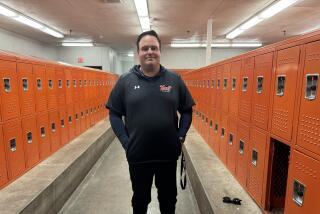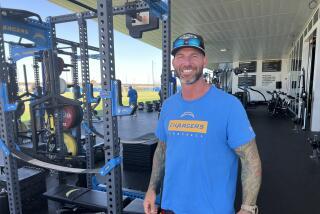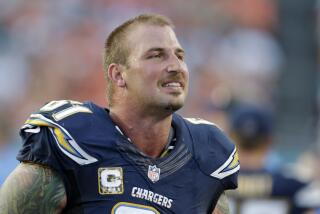Heartache and Headache
- Share via
Jim Harrick says he will be vindicated.
These are almost certainly the final days of his college coaching career if he is not.
With word Wednesday that Georgia has fired Harrick’s son, assistant Jim Harrick Jr., in the wake of charges of academic fraud and improper payments to a former player, the former UCLA coach seemingly edged closer to his end.
University President Michael F. Adams, a friend from the days when Harrick was coach at Pepperdine and Adams was an administrator there, would not even guarantee Harrick will coach the team in the Southeastern Conference tournament next week, much less the NCAA tournament.
The sordid choice in the Georgia saga is between believing Harrick, a coach who was fired at UCLA for lying, or believing Tony Cole, a former player with a checkered past.
It will take time for the NCAA and Georgia to sort out the charges, though some of them already appear to be corroborated.
But there is no need to wait to convict Harrick for an extraordinary and damning history of lapses in judgment, from repeatedly recruiting players with dicey pasts to twice arranging to hire his son as an assistant coach despite anti-nepotism policies at Rhode Island and Georgia.
UCLA, it appears, made a wise choice in avoiding the same fate.
Pete Dalis, the former UCLA athletic director, said this week Harrick also sought to hire his son in Westwood but was rebuffed because of university policy and Dalis’ misgivings.
Harrick Jr. is now is at the center of the controversy that might finally finish his father.
The other key figure is Cole, a former Bulldog player whose recruitment Harrick acknowledged at the Wooden Classic in December was “a mistake.”
He might not then have understood how big a mistake.
A player who attended five high schools -- including a stop at Compton Dominguez -- and had ties to five colleges, Cole is now the chief witness against the Harricks.
Kicked off the Georgia team last fall for various offenses -- even though another teammate was allowed to return after charges against the two in a 2002 sexual assault case were dismissed -- Cole has gone public with a long list of accusations.
In an interview with ESPN aired last week, Cole said that Harrick Jr. wired $300 to the mother of a friend to cover Cole’s telephone bills, paid three of his hotel bills totaling more than $1,000 and committed academic fraud on his behalf. Cole said Harrick Jr. gave him an A in a Georgia physical education class he didn’t attend and also arranged for someone to do correspondence work in his name when he was in junior college.
Among the most incriminating evidence: A Western Union receipt filmed by ESPN that shows $300 was sent from a Jim Harrick -- reportedly Harrick Jr. -- to Eva Davis, the mother of a high school teammate who housed Cole during the summer of 2001.
“I couldn’t tell if it was Jr., Sr. or either one of them,” Davis told the Atlanta Journal-Constitution. “He just said it was, ‘Jim Harrick.’ I just know it was a voice on the phone line that said the phone bill would be taken care of.”
On Wednesday, the newspaper reported a Rhode Island booster, Charlie Tapalian, claims he gave Harrick Jr. the $300 for the phone bill. (Harrick Jr. was an assistant under his father at Rhode Island in 1998-99. Cole signed to play for the Rams in 1999 but was refused admission after Harrick left for Georgia.)
Perhaps most damaging to Harrick: Cole’s claim to the Atlanta Journal-Constitution that he used the personal credit card of the head coach to buy a 28-inch color television.
Harrick called the charge “ludicrous” and said he has provided credit card records to disprove it.
“A vindictive young man,” a defiant Harrick called Cole in an interview with ESPN’s Dick Vitale Tuesday, shortly before an upset of No. 3 Florida by a 25th-ranked Georgia team poised for what could be Harrick’s final run in the NCAA tournament.
In addition to the charges made by Cole -- who reportedly earlier signed a university document indicating he had not received any extra benefits -- Harrick also faces scrutiny related to a sexual harassment case against Rhode Island that named Harrick and included charges of improprieties in the program. The university settled the suit last month for $45,000 and is investigating the claims.
Vitale, pressing Harrick with uncharacteristic force on the details of both cases the day before Harrick’s son was fired, finally asked, “Can you look me in the eye, we’ve been friends for a lot of years.... When this is all said and done, that Jim Harrick and Jim Harrick Jr. will be vindicated of all these charges by Tony Cole?”
Said Harrick, who often seemed to be looking toward the camera in order to appear sincere as he pleaded his case: “Absolutely. I can look you right in the eye.... I’ve been in this business 30 years. You don’t survive by giving people money, by doing people’s work for them.”
The situation at Georgia almost makes the ethical issues surrounding Harrick’s 1996 firing at UCLA -- he asked an assistant to lie about who was present at a recruiting dinner after Harrick filed a false expense report to cover a potential NCAA violation -- seem like a lark.
But the seeming avalanche of charges against Harrick is merely the culmination of numerous risks he has taken since leaving UCLA.
The most successful gamble was on Lamar Odom, a much-traveled high school player who was taken in by Harrick at Rhode Island after Nevada Las Vegas shunned Odom when the NCAA questioned his test score.
Odom established his eligibility and steered clear of trouble while starring for the Rams for one season before the Clippers made him the fourth pick in the 1999 draft.
Perhaps emboldened by that success, Harrick tried to bring in another player with a checkered past, Kenny Brunner -- a onetime Georgetown and Fresno State player -- to Georgia two years ago.
Adams first supported the recruitment, then put a halt to it.
Although Dalis said there were times when Harrick was in Westwood that he sought to recruit players Dalis vetoed, it was not uncommon in football either, and Harrick never brought in anyone with whom Dalis was not comfortable.
“We were fairly vigorous about profiling and reviewing candidates,” Dalis said. “He would bring someone to my attention and I would query more and sometimes say, ‘Jim, that’s not the direction we’re going in.’ ”
Nor were there any allegations of academic improprieties under Harrick at UCLA, Dalis said.
Harrick’s trouble in Westwood came in the fallout over the infamous recruiting dinner at Monty’s, as well as over the sale of a vehicle registered in Harrick’s name to the sister of recruit Baron Davis by another of Harrick’s three sons, Glenn.
Harrick denied knowledge of the sale, and though it seemed to represent an error in judgment at the least, the Pacific 10 Conference decided there was no wrongdoing after determining the sale price was at fair value.
Dalis said he is uncertain how he feels about Harrick’s predicament, but said he feels for the family.
“Jim can coach the game. I’ve always said that,” Dalis said. “There were always people telling me that was his personality, that Jim was a real risk-taker, but I didn’t really see it.”
In the twilight of Harrick’s career, it has become crystal clear.
In the end, his riskiest recruit might have been his son.
When Harrick Jr. played for his father at Pepperdine in the mid-1980s, Harrick affectionately nicknamed him, “Headache.”
The Harricks are a close-knit family, and after being hired at Rhode Island, Harrick eventually circumvented anti-nepotism rules by seeing that Harrick Jr. was hired to a position that reported to the athletic director instead of to the coach. (In yet another brush with trouble, Jim Harrick Jr.’s contract with Rhode Island was not renewed in 1999 after the university determined he turned in more than $900 in improper expense receipts.)
His father moved to Georgia, first accepting the job, then balking because anti-nepotism rules would prevent him from hiring his son, then finally accepting the job again.
After working for former UCLA coach and former Rhode Island assistant Larry Farmer at Loyola of Chicago for two seasons, Harrick Jr. joined his father at Georgia in 2001, skirting the anti-nepotism issue by taking a position with the development office as well as the basketball program. He later received mild notoriety when it was discovered he embellished his resume -- an odd compulsion, given that he worked with his father.
That employment ended Wednesday with his firing, though technically he will remain suspended with pay until his contract expires June 30.
Headache, indeed.
Associated Press contributed to this report.
More to Read
Go beyond the scoreboard
Get the latest on L.A.'s teams in the daily Sports Report newsletter.
You may occasionally receive promotional content from the Los Angeles Times.






